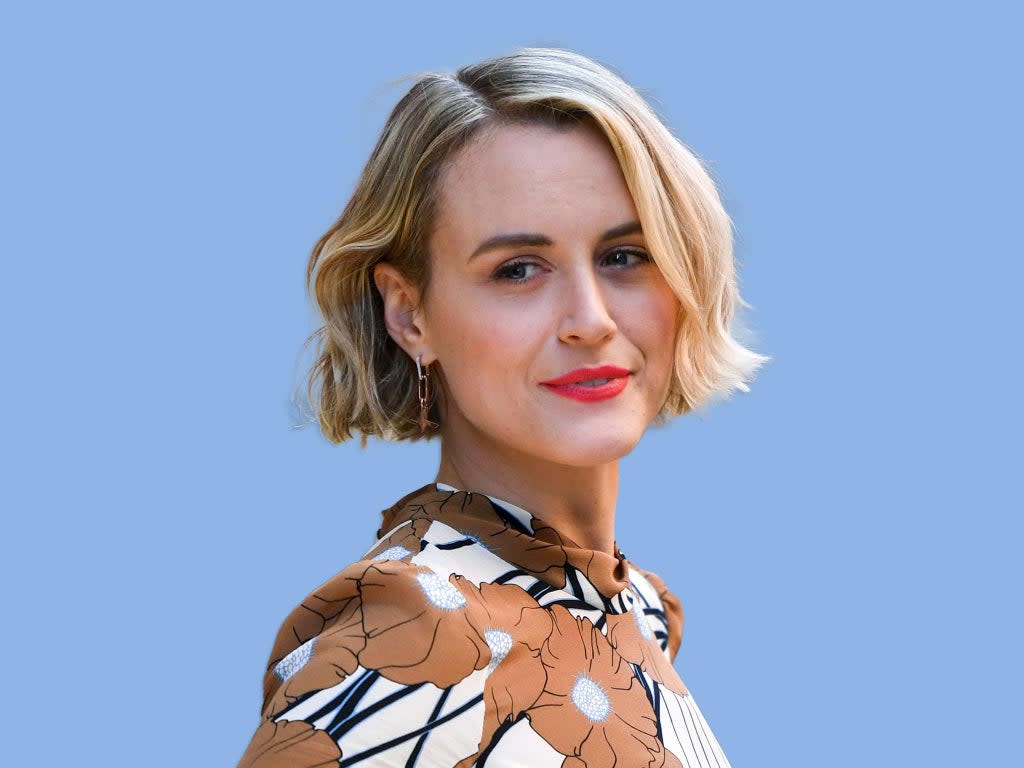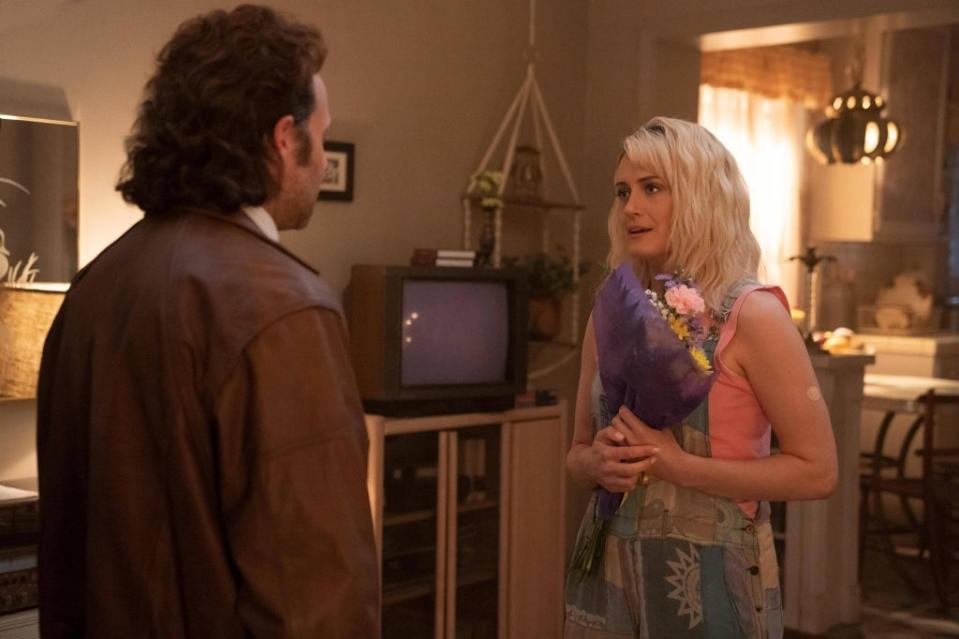Taylor Schilling: ‘I started to feel like I was just a space-holder in Orange is the New Black’

- Oops!Something went wrong.Please try again later.
- Oops!Something went wrong.Please try again later.
For most of the 2010s, Taylor Schilling led the cast of one of the queerest shows on TV. In Orange is the New Black, the unflinching comedy-drama set in a women’s prison, she played Piper Chapman, a bougie New Yorker who ends up behind bars. Yanked away from her life in the West Village selling artisanal bath products, Piper spends incarceration using sanitary towels as flip-flops and hooking up with her on-off girlfriend in the prison chapel. As The New Yorker noted at the time: “There are more lesbians here – butch and femme and of every ethnicity – than in any other series on television.” But Schilling’s personal life off screen? Well, she didn’t see how that was anyone’s business.
“I was dating men, women, all sorts of people at that time,” the 37-year-old tells me over video call from Los Angeles. “But I never was in a long-term, happy relationship, so it never crossed my mind to make it a part of my public life. I was just like, ‘Are we going to go on another date?’” She covers her face with her hands. “It’s so embarrassing! I feel uncomfortable sharing myself for the sake of it.” On Pride weekend last year, when Schilling posted an Instagram story about her girlfriend, the artist Emily Ritz, headlines exclaimed that she had “come out”. “It’s very confusing to me when people are like, ‘When you came out…’ because since I was 14, everyone’s known who I am. I’ve always been exactly who I’ve been.”
Schilling, who was nominated for an Emmy and two Golden Globes for Orange is the New Black, is talking to me between bites of a satsuma. It’s 9am on a Friday morning in LA and she’s wearing a pale pink jumper, nestled under a flowery quilt. Her teeth are impossibly white, and I get lots of flashes of them as she laughs – whether about her unruly pet bulldog or her eventful love life.
Schilling became a reluctant queer icon thanks to Orange is the New Black. And now she’s playing one from the Nineties: the porn star Erica Gauthier, known as The Ultimate Goddess of Erotica, in Pam & Tommy. The much-hyped, perma-tanned Hulu series chronicles the theft of Pamela Anderson and Tommy Lee’s 1995 sex tape. Schilling is the estranged wife of Seth Rogen’s Rand, a resentful tradie who steals and sells the video as revenge for unpaid fees.
Erica is a smart, ambitious performer who has a dirty cackle and reads vampire novels between takes. She was once enamoured of Rand, but these days she’s so fed up with him that she puts an egg timer on the table when he’s speaking. Even so, he’s constantly showing up at her door, crashing on the sofa of the flat she shares with her new girlfriend. Schilling is pleasingly impish in the role – all gold hoops, kohl eyes and playfully raised brow – and she didn’t even have to slap on a mound of prosthetics. Where Lily James and Sebastian Stan would get into hair and make-up at 3.30 in the morning, “I got to be effortless,” she says. “I basically came in and ate a sandwich and went home. I’d flit in and flit out.”
Pam & Tommy is both absurdist and hilarious. Sweetly sensitive, too. While the whole world was gawping at a newly wed celebrity couple bonking on a boat, a young woman was being violated – and it is Erica who drives this point home. “It is not porn, you asshole!” she screams at her doofus ex-husband when she finds out that his mysterious new “business venture” is selling a private home video. “When people in porn have sex on camera, we give consent for people to watch us. We sign f***ing releases, Rand.”
“Erica is such a great counterpoint to Pam,” says Schilling. “She has made the choice to be a sex worker. And she’s saying to Rand, ‘Do not conflate exploitation with my job. What I do is porn. There are consent forms. I’m happy doing what I’m doing. But Pam is a victim of a crime.’”

Erica is Rand’s motivator. All the effort he makes to turn his life around and be successful – it’s all for her. Schilling would have represented the same figure in Argo, had all her scenes not been cut. Schilling filmed lots of poignant sequences for the triple Oscar winner, as the anguished wife to Ben Affleck’s heroic CIA operative. This was in 2012, just before Orange is the New Black,and it might have been her big break. But in the final edit she only appears once, wordlessly, to hug Affleck on the front porch of their house before the credits roll.
Affleck was mortified. “He called me and explained what was going on,” says Schilling. “The movie was so brilliant… but there wasn’t space for the emotional underbelly of the story with the wife.” Affleck’s own wife at the time, the actor Jennifer Garner, sent Schilling a letter. “She wrote to me, telling me how beautiful my performance was and how she once got cut from a Woody Allen movie. They handled that like f***ing pros. They were both so loving to me that I didn’t process it as a trauma.”
Schilling had endured a run of rough luck. Her first TV series, the hospital drama Mercy, was cancelled after one season. Her first film, Dark Matter, about a university shooting massacre, wrapped a week before the 2007 killing spree at Virginia Tech. No one would touch it. “I think it’s the only Meryl Streep film that’s not received distribution!” she says, shaking her head. But Schilling never felt like these projects were failures. “Growing up in a very working-class home, every step of the way I felt so excited,” she says. Schilling grew up in Boston, dividing her time between her divorced parents. When she’d started out, she’d had to work as a nanny to pay the bills. “I felt like I was making it. To be honest, if you’re paying your own rent from working as an actor, then my God, you’ve made it.”

It was with Orange is the New Black, though, that she really made it. Within months of its release, she was a guest on some of the biggest late night talk shows in the US, from Andy Cohen to David Letterman, and was gracing the pages of Vanity Fair and Time magazine. But it was a difficult role to navigate – a “trojan horse” designed to sneak in more underrepresented stories.
“We had to follow a Waspy white lady into prison in order to shine a light on these women of colour,” says Schilling. Her comments echo those of the series’ creator, Jenji Kohan, who said when the series launched: “You’re not going to go into a network and sell a show on really fascinating tales of Black women, and Latina women, and old women and criminals. But if you take this white girl, this sort of fish out of water, and you follow her in, you can then expand your world and tell all of those other stories.”
While commissioners might not have been ready for stories led by women of colour when the show launched in 2013, a lot changed over its run, which ended in 2019. By the final series of Orange is the New Black, when society had become more progressive, there was a palpable sense of animosity towards Schilling’s character.
“In some ways, that was really hard,” says Schilling. “I felt really hurt. I took it personally and I felt like I was no longer a part of the pack. I think Piper held the projection of a lot of white privilege for the collective that was invested in the show. That’s a vital theme to discuss, but it’s also not the easiest thing to hold… It was so wonderful to be a part of, of course, then it was an interesting experience to observe the change from when we started. It really changed. I definitely observed that feeling of celebration shifting into resentment of Piper. It’s a difficult thing to not personalise that. I started to feel like my job in that show was just as a space-holder, to provide a steady middle so that other people could really shine.”
A lot has shifted since Orange is the New Black launched in 2013. It came out at the dawn of streaming, just after House of Cards, and was an instant hit. In interviews with Schilling from the time, both she and the journalists are bewildered by the idea that people could watch the whole series on the internet in one day if they wanted to. Nine years on, some people don’t even bother owning a TV anymore.
“It’s a time capsule,” says Schilling. “That moment feels like it was on a different planet, doesn’t it? It was like trying to describe TV to folks that had only had the radio.” Schilling remembers worrying that no one would bother watching her new show, because it was a web series. “There were a lot of conversations like, ‘What is it? How do I watch it?’ People asking me to send a link and not having a clue how to consume it.”
She smiles, shaking her head. “I didn’t realise at the time that Orange was the beginning of a new chapter of entertainment. I don’t think anybody did.”
‘Pam & Tommy’ is out on Disney Plus on Wednesday 2 February

